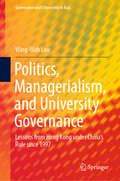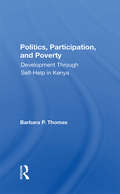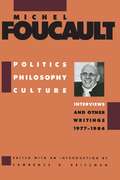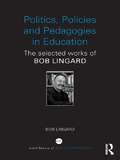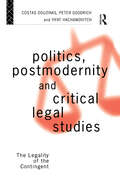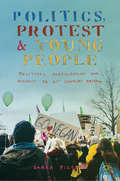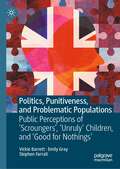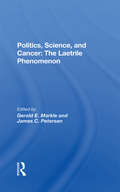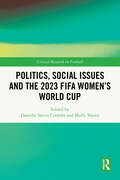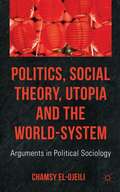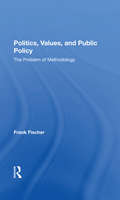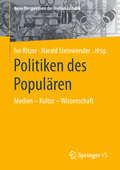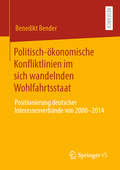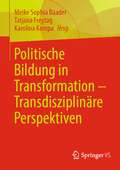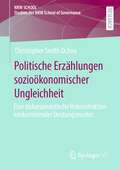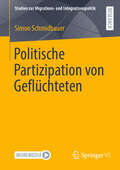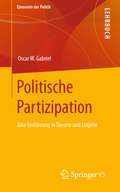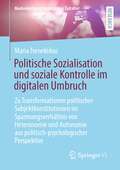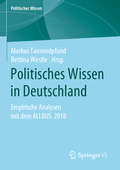- Table View
- List View
Politics, Managerialism, and University Governance: Lessons from Hong Kong under China’s Rule since 1997 (Governance and Citizenship in Asia)
by Wing-Wah LawThis book explores the interplay between politics, managerialism, and higher education, and the complex linkages between politics and public universities in Hong Kong. Since the mid-20th century, literature on the state, market, and higher education has focused on the state’s shifting role from the direct administration to the supervision of higher education, and its increased use of market and managerial principles and techniques to regulate public universities. However, very few studies have addressed the political influences on university governance produced by changing state-university-market relationships, the chancellorship of public universities, or students’ and academics’ civic engagement with regard to sensitive political issues. The book examines both the positive and problematic outcomes of using market principles and managerialism to reform public higher education; questions the longstanding tradition of university chancellorship; explores the issue of external members holding the majority on university governing boards; probes into the dilemma of either relying on the system or a good chancellor and external members to preserve universities’ autonomy and academic freedom; and assesses the cost of students’ and academics’ civic engagement with regard to politically sensitive issues.
Politics, Participation, And Poverty: Development Through Self-help In Kenya
by Barbara Thomas-Slayter Barbara P. ThomasFocusing on the distribution of benefits in relation to class, ethnicity, and gender, this book explores the methods to which the rural poor can organize themselves to participate in economic and social development and examines the roles that self-help organizations play in the political economy of Kenya. Dr. Thomas looks at the competition for pow
Politics, Philosophy, Culture: Interviews and Other Writings, 1977-1984
by Michel FoucaultPolitics, Philosophy, Culture contains a rich selection of interviews and other writings by the late Michel Foucault. Drawing upon his revolutionary concept of power as well as his critique of the institutions that organize social life, Foucault discusses literature, music, and the power of art while also examining concrete issues such as the Left in contemporary France, the social security system, the penal system, homosexuality, madness, and the Iranian Revolution.
Politics, Policies and Pedagogies in Education: The selected works of Bob Lingard
by Bob LingardIn the World Library of Educationalists, international experts compile career long collections of what they judge to be their finest pieces of work – extracts from books, key articles, salient research findings, major theoretical and practical contributions – so the world can read them in a single manageable volume. Readers will be able to follow the themes and strands and see how their work contributes to the development of the field. Bob Lingard has spent the last 30 years researching and writing in universities in Australia, England and Scotland about changing education policy issues. His work is written from a sociological perspective and with a commitment to social justice. He is the co-editor and co-author of 17 books and more than 100 journal articles and book chapters. In Politics, Policies and Pedagogies in Education, Bob Lingard provides critical sociological engagement with the politics of education. The focus is education policy and the impact of globalization, including epistemological and methodological issues necessary for researching education policy today. Topics analyzed include: educational restructuring new accountabilities and testing mediatization of education policy policy as numbers the global policy field and policy borrowing pedagogies. Lingard also considers the nature of educational research today. He has selected 12 of his key writings and in a critical introduction situates and contextualizes the work against key developments in the field and in the changing world.
Politics, Postmodernity and Critical Legal Studies: The Legality of the Contingent
by Peter Goodrich Costas Douzinas Yifat HachamovitchThis timely and assured book provides a unique guide to critical legal studies which is one of the most exciting developments within contemporary jurisprudence. It is the first book to systematically apply a critical philosophy to the substance of common law. The book develops a coruscating and interdisciplinary overview of the politics and cultural significance of the institutions of the law.
Politics, Protest and Young People: Political Participation and Dissent in 21st Century Britain
by Sarah PickardSarah Pickard offers a detailed and wide-ranging assessment of electoral and non-electoral political participation of young people in contemporary Britain, drawing on perspectives and insights from youth studies, political science and political sociology. This comprehensive book enquires into the approaches used by the social sciences to understand young people’s politics and documents youth-led evolutions in political behaviour. After unpicking key concepts including ‘political participation,’ ‘generations,’ the ‘political life-cycle,’ and the ‘youth vote,’ Pickard draws on a combination of quantitative and qualitative research to trace the dynamics operating in electoral political participation since the 1960s. This includes the relationship between political parties, politicians and young people, youth and student wings of political parties, electoral behaviour and the lowering of the voting age to 16. Pickard goes on to discuss personalised engagement through what she calls young people’s (DIO) Do-It-Ourselves political participation in online and offline connected collectives. The book then explores young people’s political dissent as part of a global youth-led wave of protest. This holistic book will appeal to anyone with an interest in young people, politics, protest and political change.
Politics, Punitiveness, and Problematic Populations: Public Perceptions of 'Scroungers', 'Unruly' Children, and ‘Good for Nothings’
by Emily Gray Stephen Farrall Vickie BarrettThis book speaks to those interested in topics related to punitiveness and public attitudes to crime and punishment. Punitiveness has been the focus of increasing criminological attention in recent decades. This book extends this focus by taking a multi-disciplinary approach to examining punitiveness in the criminal justice system, the welfare system, and the education system in British society today. In doing so, this study uses new survey data (n=5,781) applying ordinal and linear regression and structural equation modelling to examine the relationship between public punitiveness towards ‘rulebreakers’ and political values. This is explored through assessing punitive attitudes towards the treatment of i) school pupils who break school rules, ii) towards the treatment of benefit recipients who fail to comply with the rules, and iii) towards people who break the law. It examines the relationship between political attitudes (neo-conservative values, neo-liberal values), nostalgic values (social, economic, and political), and public punitive attitudes towards the three rule-breaking groups. This book’s appeal may extend to an interdisciplinary audience including welfare, education, and social policy disciplines.
Politics, Science And Cancer: The Laetrile Phenomenon
by James C. Petersen Gerald E. MarkleAt no time in U.S. history has there been a more effective challenge to medical expertise and authority than that mounted by the contemporary Laetrile movement. The efficacy of Laetrile has been debated for over twenty-five years, but despite vigorous opposition from the medical community, support for the purported cancer treatment continues to gro
Politics, Social Issues and the 2023 FIFA Women’s World Cup (Critical Research in Football)
by Danielle Sarver Coombs Molly YanityThis book takes a close look at politics and social issues in the context of the 2023 FIFA Women’s World Cup, one of the most attended women’s sporting events in history. Featuring the work of leading researchers from around the world, the book is arranged into two thematic sections, with the first examining power structures and inequalities and the second exploring nationalism, identities, and experiencing the women’s game. The book presents a series of important and fascinating cases - including campaigns for equal pay for players; governance, ethics and women’s rights in Spanish football; the legacies of the Australian Matildas; and the impact of fan spaces – that together form a multi-layered picture of a signature event in the history of women’s sport. This book is vital reading for anybody with an interest in women’s sport, gender and sport, the sociology of sport, the politics of sport, event studies or sport business and management.
Politics, Social Theory, Utopia and the World-System
by Chamsy El-OjeiliIt is common to hear that we live in unique, turbulent and crisis-ridden times and this turbulence, transformation and crisis are said to be deeply significant - perhaps threatening - for the human sciences. Responding to such claims, this book provides an accessible engagement with pressing contemporary topics, such as violence, social movements, equality, identity and democracy. Foregrounding the imagination of possibilities (utopia), the mapping of the present (theory), and the transformation of the world-system (historical and global questions), the book surveys central issues and paradigms in contemproary political sociology, urging a recommitment to certain concepts and traditions for guidance in thinking and acting in the world.
Politics, Values, And Public Policy: The Problem Of Methodology
by Frank FischerAddressed to the growing concerns about norms and values in policy assessment, this study develops a methodology for the political evaluation of public policy. It is designed to move policy evaluation beyond its current emphasis on efficient achievement of goals, focusing instead on the assessment of the acceptability of the goals themselves, emplo
Politik abseits der Parteien: Wählergemeinschaften in Deutschland (Empirische Studien zur Parteienforschung)
by Michael AngenendtIn Abgrenzung zu Parteien beschränkt sich der politische Wirkungskreis von Wählergemeinschaften auf die Kommunalpolitik, weshalb sie in Deutschland nicht die rechtlichen Kriterien für den Erwerb des Parteienstatus erfüllen. In ihrer Selbstdarstellung präsentieren sich Wählergemeinschaften deshalb als Alternative zu den in der Landes- und Bundespolitik etablierten Parteien. Michael Angenendt untersucht, ob Wählergemeinschaften faktisch Parteien darstellen, die sich unter dem Gewand der Parteifreiheit tarnen, oder ob sie sich substanziell von den Parteien unterscheiden, indem sie eine partizipatorische, parteienskeptische und organisatorische sowie elektorale Alternative bilden. Die Studie vermisst das Spektrum von Wählergemeinschaften in Deutschland umfassend und fokussiert drei Bereiche: Mitglieder, Identität sowie Organisation, Präsenz und Erfolg. Die theoretische Grundlage für die Analyse bilden etablierte Ansätze der Partizipations-, Einstellungs- und Parteienforschung. Das Werk basiert auf dem allgemeinen Interesse an den Voraussetzungen für politische Partizipation, den Ursachen von Parteienverdrossenheit und der Struktur politischer Organisationen. Als empirische Basis dient eine bundesweite Mitgliederstudie mit über 860 Befragten.
Politik im Zeichen der Erlebnisgesellschaft: Die Auswirkung von Erlebnisrationalisierung auf politischen Diskurs und Öffentlichkeit (BestMasters)
by Tristan Stinnesbeck„Die Erlebnisgesellschaft“ Gerhard Schulzes - eine furiose Zeitdiagnose der Neunzigerjahre über eine von Einschränkungen durch Knappheit befreite Bevölkerung, die in der Suche nach Sinn ihr Handeln verstärkt an einem Erlebnisanspruch ausrichtet - ist heute weitestgehend in Vergessenheit geraten. Ihre Thematik, die Ästhetisierung alltäglicher Handlungen, ist jedoch noch immer aktuell; hat im Zeitalter der Digitalisierung womöglich sogar an Relevanz gewonnen. Als neuer grenzenloser Spielraum für Erlebnisanbieter und -Nachfrager zwingt uns die digitale Sphäre nicht nur die zeitgenössischen Vorstellungen von Handlungsfreiheit zu hinterfragen; sie macht eine erneute kritische Rezeption der Erlebnisgesellschaft auch lohnend. Diese Arbeit darf als Einladung verstanden werden, über Schulzes Gesellschaftsdiagnose hinaus zu denken. In einer theoretischen Abhandlung nimmt der vorliegende Text eine Aktualisierung von Schulzes Werk mithilfe jüngerer Theorien, etwa der von Reckwitz aufgestellten, vor und weist nicht nur auf dessen Potenzial, sondern auch auf dessen Lücken hin. Während Schulze die Politik weitestgehend vernachlässigt, wird untersucht wie sich die Erlebnisrationalisierung auf alle Funktionssysteme der Gesellschaft ausweitet und gerade die politischen (Diskurs-)Räume zu einer Erweiterung des Erlebnismarktes nutzt.
Politiken der Un-Ordnung: Das Polizieren von Protest in Frankreich
by Olivier Fillieule Fabien JobardEine umfassende kritische Analyse, die Sichtweisen und Organisation der französischen Polizei, die unterschiedlichen Protestformen und Protestgruppierungen, die Medien und die politischen Rahmenbedingungen mit einbezieht. Spiegelbildlich dazu steht eine Geschichte der deutschen Polizei mit besonderer Berücksichtigung des Polizierens von Protest vom 19. Jahrhundert bis zur Gegenwart.
Politiken des Populären: Medien – Kultur – Wissenschaft (Neue Perspektiven der Medienästhetik)
by Ivo Ritzer Harald SteinwenderDer Band befragt populäre Kultur auf ihre politischen Implikationen in medialen Erscheinungsformen. Dabei problematisiert er die tradierte Dichotomie von „Kunst“ und „Pop“, um den Fokus auf offene Forschungsfragen globaler Wechselwirkungen zu legen und über die akademischen Disziplinen hinaus zu erweitern. Die einzelnen Beiträge des Bandes nähern sich dem Untersuchungsgegenstand anhand mehrerer Konfliktlinien, die ein Themenspektrum von Fragen der Ideologie, Postkolonialität und Queerness populärer Medienkulturen eröffnen. Der InhaltMediale Regimes und Populärkultur ● Genre, Gesellschaft und Politik ● Gender und RaceDie HerausgeberProf. Dr. Ivo Ritzer lehrt Medienwissenschaft an der Universität Bayreuth. Dr. Harald Steinwender ist Redakteur im Programmbereich Spiel – Film – Serie des Bayerischen Rundfunks und Programmplaner für das BR Fernsehen.
Politisch-ökonomische Konfliktlinien im sich wandelnden Wohlfahrtsstaat: Positionierung deutscher Interessenverbände von 2000 bis 2014
by Benedikt BenderIn der sozialwissenschaftlichen Literatur werden unterschiedliche Thesen zur Rolle von Interessenverbänden in Bezug auf Reformprozesse gemacht. Benedikt Bender testet in der vorliegenden Studie diese Thesen, indem die Positionierung von Gewerkschaften und Unternehmerverbänden zu gesellschaftspolitisch umstrittenen Reformdebatten analysiert werden. Der zentrale Befund ist, dass es sich um eine Koexistenz von strukturellen und strategischen Interessen der Organisationen handelt, die umso moderater wurden, je mehr institutionelle Austauschprozesse wie Tarifverhandlungen vorhanden sind.
Politische Argumentations- und Urteilskompetenz bei Schülerinnen und Schülern (Empirische Forschung in den gesellschaftswissenschaftlichen Fachdidaktiken)
by Anja SchmidtAnja Schmidt thematisiert in diesem Buch politikdidaktische Setzungen und Modelle der politischen Argumentations- und Urteilskompetenz unter Bezug auf den theoretischen und empirischen Stand der Fachdidaktik. Die Autorin geht der Frage nach, ob sich theoretische und empirische Lücken ("gap of judgement") in der politischen Argumentations- und Urteilsfähigkeit finden und untersucht die belastbare empirische Bewährung eines aktuellen Theoriemodells der politischen Urteilskompetenz.
Politische Bildung in Transformation – Transdisziplinäre Perspektiven
by Meike Sophia Baader Tatjana Freytag Karolina KempaDer Band geht aus interdisziplinären Perspektiven sich aktuell neu stellenden Fragen der Politischen Bildung nach. Herausforderungen wie Populismus, Prozesse der Re-Nationalisierung und Destabilisierung der EU fordern Akteure politischer Bildung auf, sich grundsätzlich zu öffnen, neu zu orientieren und wirklich neu zu vermessen.
Politische Erzählungen sozioökonomischer Ungleichheit: Eine diskursanalytische Rekonstruktion konkurrierender Deutungsmuster (Studien der NRW School of Governance)
by Christopher Smith OchoaSpätestens seit der Weltfinanzkrise 2008-2009 sowie der Veröffentlichung von Thomas Pikettys „Das Kapital im 21. Jahrhundert“ gehört die sozioökonomische Ungleichheit zu den kontroversesten Fragen der bundesdeutschen Politik. Nach wie vor herrscht kein Konsens darüber, ob Ungleichheit tatsächlich in dem dramatischen Ausmaß wächst, wie Kritiker:innen dies behaupten, und wenn ja, ob dies ein demokratierelevantes Problem darstellt. Die Arbeit schlägt deshalb einen narrativ-diskursanalytischen Ansatz vor, der zu verstehen verhilft, wie politische Akteur:innen Ungleichheit deuten, die Kontroverse in der Regierungspraxis behandeln und welche politischen Auswirkungen sich aus den Deutungskämpfen ergeben. Basierend auf Zeitungsartikeln, Bundestagsreden und Experteninterviews rekonstruiert der Autor die Multidimensionalität des deutschen Ungleichheitsdiskurses von 2005 bis 2019. Er identifiziert und analysiert vier zentrale Ungleichheitserzählungen in ihrer öffentlichen Ausprägung und leuchtet diese erzählerische Praxis anhand einer Fallstudie des Armuts- und Reichtumsberichts der Bundesregierung aus. Die Ergebnisse zeigen, dass sich die Verteilungsfrage stets unterschiedlich wahrnehmen lässt, normativ widersprüchlich bleibt und letztlich von der Deutungshoheit konkurrierender Erzählungen geprägt ist. Kurz: Ungleichheit ist immer politisch.
Politische Partizipation von Geflüchteten (Studien zur Migrations- und Integrationspolitik)
by Simon SchmidbauerPolitische Partizipation ist das Kernelement der Demokratie. Aufgrund der damit verbundenen Hürden können sich sozioökonomisch besser gestellte Gruppen der Gesellschaft häufiger und effektiver in den politischen Willensbildungsprozess einbringen als andere. Insbesondere im vergangenen Jahrzehnt gab es aber immer wieder politische Proteste von Geflüchteten. Sie stehen im Zentrum dieses Buchs, das der Frage nachgeht, wie sich dieses Engagement erklären lässt.Auf der Grundlage einer qualitativen Befragung von ehren- und hauptamtlich Tätigen aus Flüchtlingshilfe sowie Sprach- und Integrationskursen wird ein Theoriemodell entwickelt. Dieses erklärt politische Aktivität mittels Ressourcen, Involvierung und Netzwerken, die um migrations- und fluchtspezifische Faktoren ergänzt werden. Geflüchtete werden demnach nicht trotz, sondern gerade wegen ihrer prekären Lebenssituation politisch aktiv. Anhand einer quantitativen Befragung von Geflüchteten werden die Hypothesen des Modells einer statistischen Überprüfung zugeführt.
Politische Partizipation: Eine Einführung in Theorie und Empirie (Elemente der Politik)
by Oscar W. GabrielPolitische Partizipation ist ein wichtiges Element der Demokratie. Sie legitimiert politische Herrschaft und verbindet die Regierenden und Regierten miteinander. Deshalb beschäftigt sich die empirische Partizipationsforschung schon seit langem mit der Frage, wer sich in welcher Form, aus welchen Gründen und mit welchen Folgen politisch engagiert. Das Lehrbuch gibt einen Überblick über Ausmaß, Formen und Bestimmungsfaktoren politischer Partizipation in Deutschland und führt in die theoretischen und methodischen Grundlagen der empirischen Partizipationsforschung ein.
Politische Sozialisation und soziale Kontrolle im digitalen Umbruch: Zu Transformationen politischer Subjektkonstitutionen im Spannungsverhältnis von Heteronomie und Autonomie aus politisch-psychologischer Perspektive (Medienkulturen im digitalen Zeitalter)
by Maria TsenekidouDiese transdisziplinäre Studie widmet sich vielfältigen Wandlungen politischer Subjektivierungen im digitalen Medienumbruch aus einer subjekt-, kultur- sowie gesellschaftstheoretisch orientierten Perspektive Politischer Psychologie. Social Media Plattformen lassen sich auch als psychosoziale Räume von politischen Phantasien und als Instanzen politischer Sozialisierungen im Spannungsverhältnis von Heteronomie und Autonomie begreifen. Neben Analysen der Verdinglichung von Autorität und sozialer Kontrolle am Beispiel von Big Data werden – gegen das Phantasma totaler Kontrolle und Manipulation – auch Thesen über die mögliche Beschaffenheit subjektiven Eigensinns zur Diskussion gestellt. Politische Sozialisation wird als ein kritischer Vermittlungsbegriff erneuert sowie in der Auseinandersetzung mit Occupy, Anonymous und den Piraten für eine politisch-psychologische Perspektive in der Sozialen Bewegungsforschung fruchtbar gemacht. Zum Vorschein kommen Hintergründe der Integrationskrise des neoliberalen Kapitalismus.
Politischer Extremismus: Eine Einführung (Elemente der Politik)
by Hans-Gerd JaschkeModerner politischer Extremismus hat viele Facetten: Linke und rechte Varianten, Islamismus, Fundamentalismus und Terrorismus. Der einführende Überblick informiert über diese Begriffe und ihre Hintergründe, über gegenwärtige Szenarien und mögliche künftige Entwicklungen. Auch die aktuelle sozialwissenschaftliche Debatte wird einbezogen. Alle Formen des politischen Extremismus sind Angriffe auf die liberale Verfassungs- und Gesellschaftsordnung. Im Mittelpunkt der Erklärung steht die Abspaltung der politischen Extremismen aus der historischen Konstellation von Liberalismus, Konservatismus und Sozialismus, wie sie sich im 19. und beginnenden 20. Jahrhundert entwickelt hat. Bei der Bekämpfung des Extremismus kann es nicht darum gehen, ihn zu beseitigen, sondern darum, ihn möglichst effektiv einzudämmen.
Politisches Wissen in Deutschland: Empirische Analysen mit dem ALLBUS 2018 (Politisches Wissen)
by Markus Tausendpfund Bettina WestleWas und wie viel wissen die Menschen in Deutschland über Politik? Wie ähnlich oder unterschiedlich sind die Wissensstände in verschiedenen Bevölkerungsgruppen? Was sind hinderliche und was förderliche Faktoren für den Wissenserwerb? Und: Was sind Folgen des politischen Wissensniveaus für Einstellungen gegenüber Politik und Partizipation? Mit diesen Fragen beschäftigt sich der vorliegende Band zu politischem Wissen auf Grundlage der Allgemeinen Bevölkerungsumfrage der Sozialwissenschaften 2018. Auf Basis des ALLBUS 2018 werden politisches Wissen der Bevölkerung erfasst, Wissensniveaus beschrieben, zentrale Bestimmungsfaktoren identifiziert und Folgen politischen Wissens in Deutschland untersucht.
Politisches Wissen: Korrekte Kenntnisse, Fehlvorstellungen und Ignoranz (Politisches Wissen)
by Markus Tausendpfund Bettina WestleWissenschaftliche Arbeiten zu politischem Wissen der Bevölkerung in Deutschland konzentrieren sich zumeist auf die Analyse vorhandener Faktenkenntnisse und stellen diesen die zusammengefassten fehlenden und falschen Antworten gegenüber. Damit wird die Differenzierung zwischen Fehlvorstellungen (falsche Antworten) und Ignoranz (fehlende und „weiß nicht“ Antworten) vernachlässigt. Die Beiträge dieses Bands greifen diese Differenzierung mit unterschiedlichen Untersuchungsdesigns und zu verschiedenen Politikbereichen auf. Die Befunde zeigen, dass falsche und fehlende substanzielle Antworten nicht zusammengefasst werden sollten, da sie sowohl mit unterschiedlichen Determinanten als auch verschiedenen Folgen verbunden sind.
